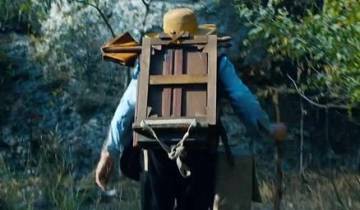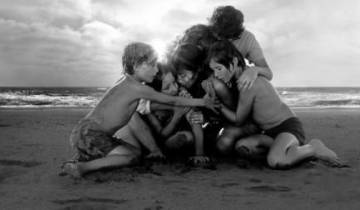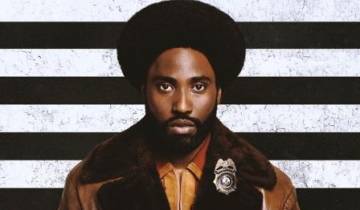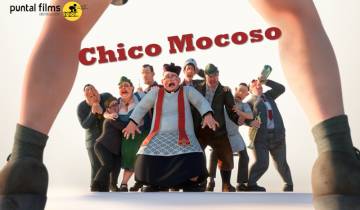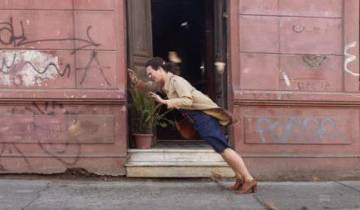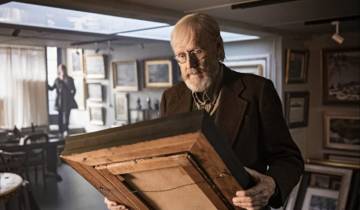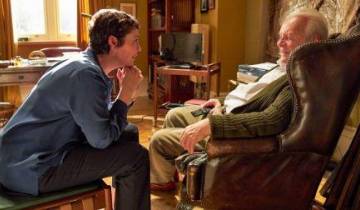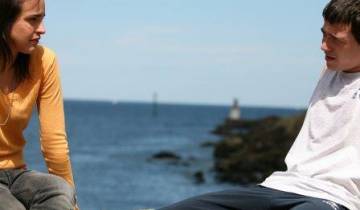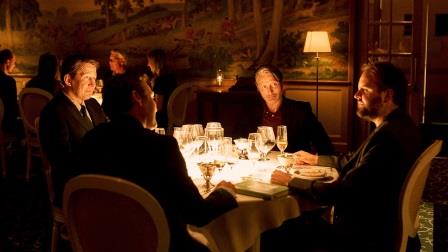
Another round
Original title: Druk
Director: Thomas Vinterberg
Script: Thomas Vinterberg and Tobias Lindholm
Performers: Mads Mikkelsen (Martin), Thomas Bo Larsen (Tomy), Magnus Millang (Nikolaj) and Lars Ranthe (Peter).
Country and Year: Denmark, 2020
Duration: 115 min


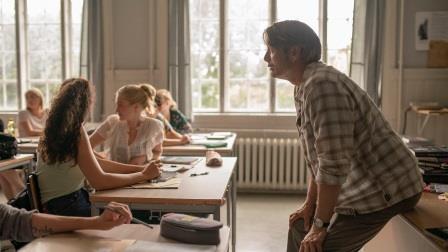
By Adriana Schmorak Leijnse
“Now I just miss my first longing. What is youth? A dream. What is love? The content of the dream ”Diapsalmata
"
by Søren Kierkegaard when we have the information.
Another Round (Danish, Druk) is a 2020 Danish drama film directed by Thomas Vinterberg, from a script by Vinterberg and Tobias Lindholm. It stars Mads Mikkelsen, Thomas Bo Larsen, Magnus Millang, and Lars Ranthe.
It had its world premiere at the Toronto International Film Festival on September 12, 2020. It was released in Denmark on September 24, 2020 by Nordisk Film, and was shown at the Adelaide Film Festival in October 2020. It won an Oscar that same year, as best international film, at the 93rd Academy Awards in Hollywood.
Synopsis:
Professors Martin (history), Tommy (physical education), Peter (psychology) and Nikolaj (music) are colleagues and friends at a Copenhagen school. All four struggle with unmotivated students and feel that their lives have become dull and stale. At a dinner to celebrate Nikolaj's 40th birthday, the group begins to discuss a theory by psychologist Finn Skårderud, who has assumed that every human being should maintain a blood alcohol content of 0.05 in order to become more creative and relaxed.
As the group dismisses the theory, Martin, who is depressed due to problems in his marriage, takes inspiration and starts drinking again. The rest of the group eventually decide to join him, intending to test Skårderud's theory. They agree on a set of rules: their BAC should never be below 0.05 and they shouldn't drink after 8pm.
Even finding that their lives have improved, the group decides to try binge drinking to see how their bodies and minds respond. The group has a fun night, but after coming home drunk, both Martin and Nikolaj are confronted by their families.
Martin's family expresses concern that he is descending into alcoholism, revealing that he has been visibly drunk for weeks. After a heated argument during which Martin's wife admits to her infidelity, Martin drives her out of the house. The group abandons the experiment.
Inspiration:
The film was based on a play that Vinterberg had written while working in Vienna. Additional inspiration came from Vinterberg's own daughter Ida, who had told stories about the drinking culture of Danish youth. Ida had originally pressured Vinterberg to adapt the work to the cinema, she would also be the one who would play Martin's daughter (Mads Mikkelsen). The story was originally "A celebration of alcohol based on the thesis that world history would have been different with alcohol." However, four days after filming, Ida died in a car accident. After the tragedy, the script was reworked to become more alive, stating that “It shouldn't just be about drinking. It's about waking up to life, ”Vinterberg said.
Meta
The whole movie relies on a false premise to reach a certain conclusion. The result of the experience turned out to be that drinking a certain amount of alcohol can improve performance and make the person feel released from their inhibitions. But it can also get out of control. As it happened with Tommy. In any case, it is important to clarify that many viewers may have taken the film as an apology for alcoholism.
The first sequence looks like a documentary, according to the principles of Dogma 95, a group of which Vinterberg was a part along with Lars von Trier and Søren Kragh-Jacobsen, among others. An outdoor race for young people who compete with the goal of reaching the goal with as much beer as possible in their body, without urinating or vomiting on the way. It seems like a joyful activity, surrounded by green and full sun.
This first sequence, camera in hand, is contrasted with the sober next scene, with much chiaroscuro, of the music teacher's birthday dinner. The 40 years is the age when a man looks back as if his youth had been just a dream and wonders about the meaning of his life. A dream of youth that ends. The center of the table is brightly lit, right where the wine and glasses are, is where the focus was placed the most, being the back of the restaurant, the darkest area. In this background appears a huge hunting painting, which refers us to Vinterberg's film, “The Hunt” (2012).
The faces of the four teachers are lit up. These four are stages in the life of a grown man. The single, the married with small children, the married on the verge of divorce and the divorced who was alienated from his wife and children. In the same way as the student Todd Anderson, played by Ethan Hawke, in "The Society of Dead Poets" (Peter Weir, 1989) (1) whose suicide originated directly from the impossibility of fulfilling his vocation as an actor, the teacher Druk's gymnastics career slipped into alcoholism and depression from not enduring being cut off from his family and his job.
They wonder what is the legacy we leave if in the end their students will not remember them. Forgetfulness is a form of death. Time passes and youth becomes degradation and death. So what is the point of our efforts?
The history teacher, Martin, still dressed in his colleague's funeral outfit, dances jazz totally uninhibited and happy for the news of the return of his love home, from which he was irretrievably separating. His happiness seems complete, as well as the disinhibition of his self, since the history teacher had wanted to be a dancer long before he took the teaching profession.
The fact that the director freezes the image of Martin at the moment in which he throws himself into the water, and his mourning suit, conveniently cut behind his back so that it refers to a pair of wings flapping in the wind, in total Freedom is a message about the brevity of life and the need to live it fully, because we are all going to die. It is a “Carpe Diem” that also appears in “The Society of the Dead Poets”, as well as the unorthodox techniques of the history teacher that are reminiscent of those of Professor John Keating (Robin Williams) in that 1989 Peter Weir film.
To further clarify the introduction and the epilogue of “Another Round”, it is important to talk about what Nietzsche called the Apollonian and the Dionysian. José Rafael Hernández Arias comments, in the Introduction to the book "The Birth of Tragedy" by Friedrich Nietzsche, the following: "Thus, the Apollonian-Dionysian world is described as the artistic world par excellence, born of the" dream "(world Apollonian) and drunkenness (Dionysian world), merging the poetic aspect of vision, plastic and poetic art with the orgiastic aspect that is embodied in music. ”(2)
The Apollonian and the Dionysian are not opposites, and if they were, they would function as complementary opposites. Here the theme of sleep and drunkenness appears once again as ways of liberating the unconscious in a creative way, putting the human experience at the service of the arts, especially music and dance.
The orgiastic and drunkenness we see in the movie "Druk" from beginning to end, as a liberating proposal. The Apollonian dream can be read in Kierkegaard's text and also in the film "The Society of Dead Poets" in which, I believe, Vinterberg has been inspired.
In the same way, Nietszche draws on Wagner's 'total work of art' to present the apotheosis of art and culture: a work that harmoniously combines song, literature, dance and performance.
“Precisely his conception of the 'total work of art' (he refers to Wagner's conception) was inspired by what the master considered the most venerable tradition in the history of Western culture: the Greek tragedy, which combined from a singing, text, dance and gesture in an incomparable way, forming a harmonious whole. ”(3)
We find this final apotheosis in the jazz dance that Professor Martin displays in front of the students who have just graduated from school. The latter is clearly a Dionysian state, of ecstasy and euphoria, as is drunkenness. The group presentation of the young people dressed in white, wearing sailor hats as garlands, exulting at the entrance to the next school stage, reminds us of a chorus of Greek tragedies.
In the "Dead Poets Society", Peter Weir externalizes "the total work of art" through Shakespearean theater which, not by chance, carries the word "dream" in its title. Because "A Midsummer Night's Dream" is also useful in the Greek theater, in that pair between the Apollonian and the Dionysian.
"Wagner assumes this conclusion and is convinced that, in art, and especially in music, man experiences a radical transformation of consciousness by which he can stop the decline of culture and spirit." (4)
Director Vinterberg criticizes Danish society, heir to the rigid principles of Lutheranism. A hyper-ordered society that does not give rise to the expressions of creativity of the individual, outside of the normalized patterns. Martin manages to escape these patterns and not only thanks to his studies of history but in particular to the manifestation of his passions through dance. Martin thus experiences "a radical transformation of consciousness" that saves him from entering a sad decline, as happened with the late Tomy, the physical education teacher. In a section of the dialogue between Peter, the psychology teacher, and a student who fails to pass the last exam, the following is expressed:
Sebastian: The conception of anxiety was? Well, Kierkegaard's concept of anxiety illustrates how a human being deals with the notion of failure.
Peter: And more importantly?
Sebastian: With having failed, you must accept yourself as fallible to love others and life.
Peter: Sebastian, can you give us an example? Sebastian: Yes, I myself have failed
(Dialogue between Peter and his student Sebastian in "Druk")
Søren Aabye Kierkegaard was born in Copenhagen on May 5, 1813 and died on November 11, 1855. He was a Danish philosopher and theologian, considered the father of existentialism.
His philosophy focuses on the condition of human existence, on the individual and subjectivity, on freedom and responsibility, on despair and anguish, themes that Martin Heidegger, Jean-Paul Sartre and other philosophers of the XNUMXth century would take up.
Much of his work deals with religious issues: the nature of the Christian faith, the institution of the Church, Christian ethics, the emotions and feelings that individuals experience when faced with the choices that life poses.
Kierkegaard made several keen observations about the nature of the generation of his day and their dispassionate attitude to life. He wrote that "the current generation is essentially rational, devoid of passions ... The trend today is in the direction of the mathematical equation" (5). Kierkegaard attacked the conformity and cultural assimilation of individuals in an undifferentiated audience, the mass. In the film "Another Round", the main criticism is directed at the rigid education given in schools, in which students are not encouraged to be creative, to think for themselves and to take an interest in multiple ways in the topics covered. They are educated to be logical and rational and to be part of the crowd, not to be individuals with feelings, desires and passions. They are not taught to doubt.
As part of his analysis of the public, Kierkegaard pointed to the decline of the Christian church, especially the Danish People's Church. He criticized attempts to reach God through objective reasoning. On the contrary, he believed that doubt is an essential element of faith.
In "The Mortal Illness" (1849), Kierkegaard proposes self-analysis as a means of understanding the problem of "despair", which according to him does not come from depression, but from the alienation of the self.
The self that failed in its goal has become intolerable; the person would have wanted to become a different self, and at such a moment is trapped in a failed self. Such denial of self is painful, for despair is overwhelming when a man shuns himself: when he is not himself.
Kierkegaard believed that the despair of the individual disappears when he stops denying who he really is and tries to discover and accept his true nature.
“More and more man is invited to escape from himself and immerse himself in the mass, to live according to generality, Kierkegaard's thought is for us a voice crying out for a return to a more authentic existence, where man is capable of confront oneself in a mature and conscious way. ”(6)
Notes
-1 Todd Anderson (Ethan Hawke) commits suicide for not being able to follow his vocation as an actor. He played Puck at school and Puck is a character like Cupid in Shakespeare's "A Midsummer Night's Dream." Puck makes everyone dream a dream of summer, temporary, seasonal love. That summer dream is also a dream of youth, of love, of passion. It is the same dream that Kierkegaard refers to in his quote.
-2 Nietzsche, Friedrich. The Birth of Tragedy. Ed Valdemar. Madrid, Feb. 2012, page 18
-3 Op.Cit. page 26
-4 Nietzsche, Friedrich. The Birth of Tragedy. Ed Valdemar. Madrid, Feb. 2012. Page 26
-5 Kierkegaard, Soren. A literary Review. Penguin Classics, 2001. ISBN 0-14-044801-2
-6 Ferreira Santos, Pedro Carlos. The actuality of Kierkegaard's concept of anguish. Journal of the Universidade do Vale do rio Verde. Três corações, vol.9, n2, p202-214. Aug / Dec. 2011
BIBLIOGRAPHY:
Nietzsche, Friedrich. The Birth of Tragedy. Ed Valdemar. Madrid, Feb 2012
Kierkegaard, Søren. A literary Review, Penguin Classics, London, 2001, ISBN 9780140448016
Druk - Wikipédia, a encyclopedia livre (wikipedia.org)
Ferreira Santos, Pedro Carlos. The actuality of the concept of anguish according to Kierkegaard.
Magazine of the Universidade do Vale do rio Verde. Três corações, v.9, n2, p202-214. Aug / Dec 2011
Soren Kierkegaard -
Wikipedia, the free encyclopedia
Dead Poets Society-
Wikipedia Website
